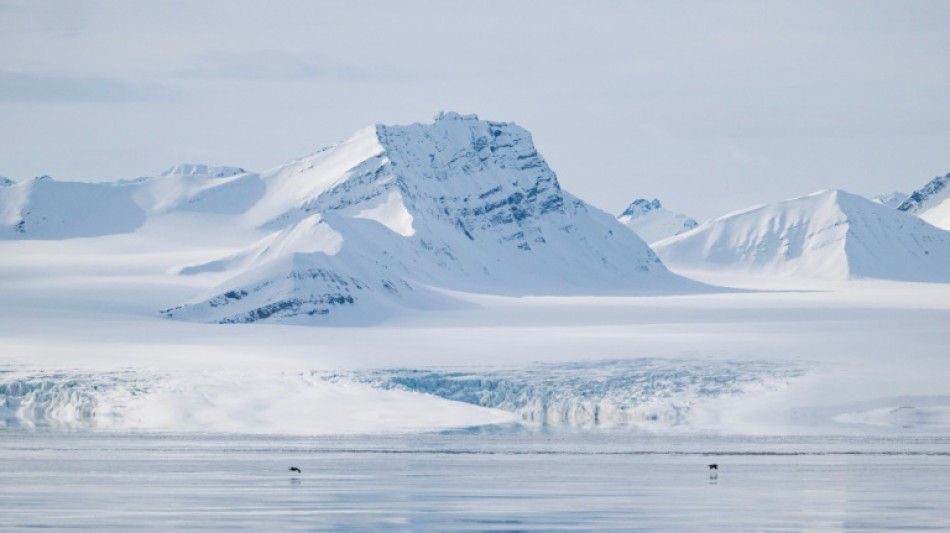
-
 Asian markets rally with Wall St as rate hopes rise, AI fears ease
Asian markets rally with Wall St as rate hopes rise, AI fears ease
-
Jailed Malaysian ex-PM Najib loses bid for house arrest

-
 Banned film exposes Hong Kong's censorship trend, director says
Banned film exposes Hong Kong's censorship trend, director says
-
Duffy, Patel force West Indies collapse as NZ close in on Test series win

-
 Australian state pushes tough gun laws, 'terror symbols' ban after shooting
Australian state pushes tough gun laws, 'terror symbols' ban after shooting
-
A night out on the town during Nigeria's 'Detty December'

-
 US in 'pursuit' of third oil tanker in Caribbean: official
US in 'pursuit' of third oil tanker in Caribbean: official
-
CO2 soon to be buried under North Sea oil platform

-
 Steelers edge Lions as Bears, 49ers reach playoffs
Steelers edge Lions as Bears, 49ers reach playoffs
-
India's Bollywood counts costs as star fees squeeze profits

-
 McCullum admits errors in Ashes preparations as England look to salvage pride
McCullum admits errors in Ashes preparations as England look to salvage pride
-
Pets, pedis and peppermints: When the diva is a donkey

-
 'A den of bandits': Rwanda closes thousands of evangelical churches
'A den of bandits': Rwanda closes thousands of evangelical churches
-
Southeast Asia bloc meets to press Thailand, Cambodia on truce

-
 As US battles China on AI, some companies choose Chinese
As US battles China on AI, some companies choose Chinese
-
AI resurrections of dead celebrities amuse and rankle

-
 Steelers receiver Metcalf strikes Lions fan
Steelers receiver Metcalf strikes Lions fan
-
Morocco coach 'taking no risks' with Hakimi fitness

-
 Gang members given hundreds-years-long sentences in El Salvador
Gang members given hundreds-years-long sentences in El Salvador
-
Chargers, Bills edge closer to playoff berths

-
 Gang members given hundred-years-long sentences in El Salvador
Gang members given hundred-years-long sentences in El Salvador
-
Hosts Morocco off to winning start at Africa Cup of Nations

-
 No jacket required for Emery as Villa dream of title glory
No jacket required for Emery as Villa dream of title glory
-
Amorim fears United captain Fernandes will be out 'a while'

-
 Nigerian government frees 130 kidnapped Catholic schoolchildren
Nigerian government frees 130 kidnapped Catholic schoolchildren
-
Captain Kane helps undermanned Bayern go nine clear in Bundesliga

-
 Captain Kane helps undermanned Bayern go nine clear
Captain Kane helps undermanned Bayern go nine clear
-
Rogers stars as Villa beat Man Utd to boost title bid

-
 Barca strengthen Liga lead at Villarreal, Atletico go third
Barca strengthen Liga lead at Villarreal, Atletico go third
-
Third 'Avatar' film soars to top in N. American box office debut

-
 Third day of Ukraine settlement talks to begin in Miami
Third day of Ukraine settlement talks to begin in Miami
-
Barcelona's Raphinha, Yamal strike in Villarreal win

-
 Macron, on UAE visit, announces new French aircraft carrier
Macron, on UAE visit, announces new French aircraft carrier
-
Barca's Raphinha, Yamal strike in Villarreal win

-
 Gunmen kill 9, wound 10 in South Africa bar attack
Gunmen kill 9, wound 10 in South Africa bar attack
-
Allegations of new cover-up over Epstein files

-
 Atletico go third with comfortable win at Girona
Atletico go third with comfortable win at Girona
-
Schwarz breaks World Cup duck with Alta Badia giant slalom victory

-
 Salah unaffected by Liverpool turmoil ahead of AFCON opener - Egypt coach
Salah unaffected by Liverpool turmoil ahead of AFCON opener - Egypt coach
-
Goggia eases her pain with World Cup super-G win as Vonn takes third

-
 Goggia wins World Cup super-G as Vonn takes third
Goggia wins World Cup super-G as Vonn takes third
-
Cambodia says Thai border clashes displace over half a million

-
 Kremlin denies three-way US-Ukraine-Russia talks in preparation
Kremlin denies three-way US-Ukraine-Russia talks in preparation
-
Williamson says 'series by series' call on New Zealand Test future

-
 Taiwan police rule out 'terrorism' in metro stabbing
Taiwan police rule out 'terrorism' in metro stabbing
-
Australia falls silent, lights candles for Bondi Beach shooting victims

-
 DR Congo's amputees bear scars of years of conflict
DR Congo's amputees bear scars of years of conflict
-
Venison butts beef off menus at UK venues

-
 Cummins, Lyon doubts for Melbourne after 'hugely satsfying' Ashes
Cummins, Lyon doubts for Melbourne after 'hugely satsfying' Ashes
-
'It sucks': Stokes vows England will bounce back after losing Ashes


Scientists save ancient Arctic ice in race to preserve climate history
Scientists have succeeded in saving samples of ancient Arctic ice for analysis in a race against time before it melts away due to climate change, they said this week.
The eight French, Italian and Norwegian researchers camped in Norway's Svalbard archipelago in March and April, braving storms and mishaps to preserve crucial ice records that can be used to analyse what the Earth's climate looked like in the past and chart the devastating impact human activity is having on it now.
The Ice Memory Foundation team extracted three huge tubes of glacier ice on Svalbard. They, like others collected by the 20-year project launched in 2015, will be preserved for future scientific analysis at a research station in Antarctica.
Analysing chemicals in such deep "ice cores" provides valuable data about centuries of past climatic and environmental conditions, long after the original glacier has disappeared.
But it is a race to preserve this "ice memory". Experts warn that as global temperatures rise, meltwater is leaking into ancient ice and risks destroying the geochemical records it contains before scientists can collect the data.
When the Ice Memory team set up camp in March on Holtedahlfonna, one of the highest and most northerly glaciers in the Arctic, the first hitch was the weather.
Instead of the expected -25 degrees Celsius (-13 degrees Farenheit), fierce winds forced the temperature down to -40C, delaying drilling for several days.
Then, once they had bored a 24.5-metre (80-foot) hole in the ice, water from the melting glacier rushed into it.
Even though radar data collected since 2005 showed there was some meltwater inside the Holtedalhfonna glacier, "we did not expect to find such an extended, abundant and saturated aquifer in the selected drilling site, at the end of winter", explained Jean-Charles Gallet, snow physicist at the Norwegian Polar Institute and expedition coordinator.
"Glaciers are not only dramatically losing their mass but also their cold content."
- 'Dramatic climate change' -
Aquifers are underground reservoirs of freshwater or saltwater that permeate the ice crystals in glaciers and weaken them.
"Seeing all that water in the glacier gave us the clearest evidence yet of the effects that dramatic climate change is having in the Arctic," said Daniele Zannoni, a member of the team from the Ca’ Foscari University in Venice.
Human-caused carbon emissions have warmed the planet by 1.15 degrees Celsius since industrialisation, powered by fossil fuels, began the 19th century. Studies indicate that the Arctic is warming between two and four times faster than the global average.
On Friday, the United Nations said the world's 40-odd "reference glaciers" -- those for which long-term observations exist -- are more than 26 metres thinner now on average than in 1970.
The pressure of the meltwater rushing into the Holtedalhfonna drill hole damaged two of the team's driller motors, forcing them to relocate to the summit of the Dovrebreen glacier, 13 metres higher up.
When drilling resumed, the researchers succeeded in extracting three ice cores 50-75 metres long. The strata and air bubbles trapped in these precious translucent cylinders, just a dozen centimetres in diameter, could contain up to 300 years of climate history.
- Race against time -
The race is on for glaciologists, who "are seeing their primary material disappear forever from the surface of the planet", Jerome Chappellaz, president of the Ice Memory foundation, told AFP on April 3.
"It is our responsibility as glaciologists of this generation to make sure a bit of it is preserved."
When the researchers had three ice samples, the temperature in Svalbard shot up to -3C, turning part of the route back to their base at the Ny-Alesund research station into a treacherous torrent of water.
Two of the ice cores made it base but the third is still stuck at the drilling site, waiting for more clement weather to be shipped out.
In the meantime, Ice Memory has put out an international plea to other researchers.
"We do need (them)... rapidly to collect samples from endangered glaciers or to save... already collected ice cores, to preserve these very precious data in the Ice Memory sanctuary in Antarctica," said paleoclimatologist and Ice Memory vice-chair Carlo Barbante.
"If we lose archives like this, we will lose the memory of human alteration of the climate," stressed Ice Memory director Anne-Catherine Ohlmann.
"We will also lose crucial information for future scientists and policymakers, who will have to make decisions for the well-being of society.”
T.Ward--AMWN



